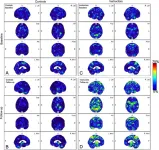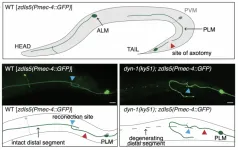(Press-News.org) OAK BROOK, Ill. – New research finds that the brains of otherwise healthy military personnel who are exposed to explosions show an abnormal brain accumulation of amyloid-beta protein—a protein that plays a role in the development of Alzheimer’s disease. The results of the study were published today in Radiology, a journal of the Radiological Society of North America (RSNA).
Research over the last several decades suggests that there might be a relationship between repetitive or severe traumatic brain injury (TBI) and abnormal amyloid-beta accumulation. Certain forms of amyloid-beta can accumulate into tangles and plaques in the brain which can lead to cognitive decline and neurodegenerative diseases such as Alzheimer’s disease.
“Amyloid-beta is a molecule not normally found in the brains of young patients,” said study author Carlos Leiva-Salinas, M.D., Ph.D., M.B.A., associate professor of radiology at the University of Missouri School of Medicine in Columbia, Missouri. “Amyloid-beta accumulation in the brain is proposed to be an early event in the pathogenesis of Alzheimer’s disease, the most common type of dementia worldwide, impacting millions of people.”
TBI can be the result of direct head trauma, such as from a fall or from playing contact sports, but it can also result from indirect forces—such as shockwaves from battlefield explosions—that shake the brain violently in the skull.
Previous autopsy studies have shown the presence of amyloid plaques as early as hours after severe brain injury.
“Non-invasive positron emission tomography, or PET, imaging could be used to identify early-stage amyloid-beta accumulation in individuals or professions exposed to traumatic brain injury such as military personnel, police officers, firefighters, football players, etc.,” Dr. Leiva-Salinas said.
For the study, researchers recruited nine military grenade or breacher instructors at Fort Leonard Wood Military Base in Fort Leonard, Missouri, from January 2020 to December 2021. Grenade and breacher instructors are military officers who train recruits in the use of hand grenades and explosives or other mechanical methods to force open doors.
An additional nine civilians were included in the study as a healthy control group. All participants had no previous history of concussion, and they were all males in their early 30s, an age at which amyloid accumulation is not expected.
The 18 participants were evaluated twice. The first evaluation was to establish a baseline and the second occurred after blast exposure, approximately five months after the baseline examination. The military instructors filled out a digital log with the number of exposures to explosions, including the firing of weapons. The control participants were evaluated at similar time points.
All participants underwent a PET scan of the head to evaluate and quantify amyloid changes. Analysis software was used to segment six brain regions that are usually associated with Alzheimer’s disease and TBI.
Abnormal amyloid accumulation was seen in six of the nine participants who were exposed to explosions. Three of the participants had one region of the brain with increased amyloid accumulation, two participants had two regions, and one participant had three regions with abnormal accumulation.
None of the healthy control participants showed any abnormal amyloid accumulation.
“Further research needs to be done to establish the relationship between the frequency and the severity of traumatic brain injury and the degree of amyloid changes in the brain, the natural course of the observed accumulation, and other potential biologic risk factors for amyloid plaque deposition and the development of cognitive decline,” Dr. Leiva-Salinas said.
###
“Early Brain Amyloid Accumulation on PET in Military Instructors Exposed to Subconcussive Blast Injuries.” Collaborating with Dr. Leiva-Salinas were Amolak Singh, M.D., Eleanor Layfield, M.D., Lucia Flors, M.D., Ph.D., M.B.A., and James T. Patrie, M.S.
In 2023, Radiology is celebrating its 100th anniversary with 12 centennial issues, highlighting Radiology’s legacy of publishing exceptional and practical science to improve patient care.
Radiology is edited by Linda Moy, M.D., New York University, New York, N.Y., and owned and published by the Radiological Society of North America, Inc. (https://pubs.rsna.org/journal/radiology)
RSNA is an association of radiologists, radiation oncologists, medical physicists and related scientists promoting excellence in patient care and health care delivery through education, research, and technologic innovation. The Society is based in Oak Brook, Illinois. (RSNA.org)
For patient-friendly information on PET, visit RadiologyInfo.org.
END
A study explores the role of the dynamin protein DYN-1 in axonal fusion. The axon is a long, thin protrusion of nerve cells that carries electrical impulses. Severed axons can be repaired by a highly efficient regrowth process known as axonal fusion. Previous research has shown that molecules involved in apoptosis—programmed cell death—are also involved in axonal repair. Because dynamin is involved in apoptosis, specifically in the recognition of dying cells, Brent Neumann and colleagues posited that dynamin might also be involved in axonal repair. The team severed axons in the model organism Caenorhabditis elegans, a multicellular nematode worm with just a few hundred ...
A new U of T Scarborough study finds that climate change is causing a commercially significant marine crab to lose its sense of smell, which could partially explain why their populations are thinning.
The research was done on Dungeness crabs and found that ocean acidification causes them to physically sniff less, impacts their ability to detect food odours and even decreases activity in the sensory nerves responsible for smell.
“This is the first study to look at the physiological effects of ocean acidification on the sense of smell in crabs,” says Cosima Porteus, an assistant professor in the department of ...
How do our genes affect what we eat? Can more sustainable diets also improve health? What are the best foods for living longer, fighting cancer, and staying mentally sharp as we age?
You’ll find the answers to these questions and more at NUTRITION 2023, the annual flagship meeting of the American Society for Nutrition. Join us July 22-25 in Boston for an exciting lineup of scientific symposia, educational sessions, hot-topic discussions, and award lectures covering the latest developments in nutrition science.
Get a sneak peek at the ...
BROOKLYN, NEW YORK (May 9, 2023) — Today, the NYC Media Lab announced the availability of new immersive educational content for all US-based educators. Developed in partnership with Verizon for the $1M Museum Initiative, over 50 augmented reality (AR)- and virtual reality (VR)-focused lesson plans are available on Verizon Innovative Learning HQ (verizon.com/learning)—the free online education portal that brings next-gen learning to all.
Through the $1M Museum Initiative—a nationwide open call for museums and cultural institutions to develop ...
COLUMBUS, Ohio – Partisan conflict can be largely explained as differing views on two crucial tasks of society, according to a new theory developed by a pair of prominent social scientists.
In a new article published yesterday (May 8, 2023) in the journal Psychological Inquiry, Roy Baumeister and Brad Bushman say societies flourish by both amassing and distributing resources.
Conservatives focus on amassing resources, while liberals concentrate on distributing resources. The problem is both sides increasingly tend to disparage the value of what the other side champions, the authors said.
“Both tasks are absolutely essential for society,” ...
Even without body parts that allowed for movement, new research shows — for the first time — that some of Earth’s earliest animals managed to be picky about where they lived.
These creatures from the Ediacaran Period, roughly 550 million years ago, are strangely shaped soft-bodied animals that lived in the sea. Researchers have long considered them enigmatic.
“It’s not like studying dinosaurs, which are related to birds that we can observe today,” said Phillip C. Boan, UC Riverside paleontology graduate student and lead author of the new study. “With these animals, because they have no modern descendants, we’re ...
A new solution, known as E-MOTIVE, could provide a major breakthrough in reducing deaths from childbirth-related bleeding, according to a landmark study published today by researchers from the World Health Organization (WHO) and the University of Birmingham.
Postpartum haemorrhage (PPH) - defined as the loss of more than 500 mL of blood within 24 hours after birth - is the leading cause of maternal mortality worldwide. It affects an estimated 14 million women each year and results in around 70 000 deaths – mostly in low and middle-income countries - equivalent to 1 death every 6 minutes
“Postpartum haemorrhage is scary, not always predictable, ...
University of Pittsburgh researchers have developed a universal receptor system that allows T cells to recognize any cell surface target, enabling highly customizable CAR T cell and other immunotherapies for treating cancer and other diseases. The discovery could extend into solid tumors and give more patients access to the game-changing results CAR T cell therapy has produced in certain blood cancers.
Described in a Nature Communications study published today, the new approach involves engineering T cells with receptors bearing a universal ...
COVID vaccines offered varying degrees of protection in the six months after patients receive them, with levels climbing and plunging in two cases and climbing and climbing in another. Age, sex, body mass index (BMI) and smoking status also play roles, according to new UC San Francisco research.
In the BOOST study (Building Optimal antibOdies STudy), researchers tracked the response to the Pfizer, Moderna and Johnson & Johnson vaccines in blood samples of 498 healthy volunteers, ages 18 to ...
A world-leading oral health expert from the University of Birmingham, whose pioneering research concentrates on the link between oral health and non-communicable diseases such as diabetes, is to investigate the impact of a technology described as one of the biggest innovations in preventative dentistry since fluoride.
Professor Iain Chapple and his research group at the University’s School of Dentistry, will work with Sigrid Therapeutics to identify and develop further applications for a technology ...






